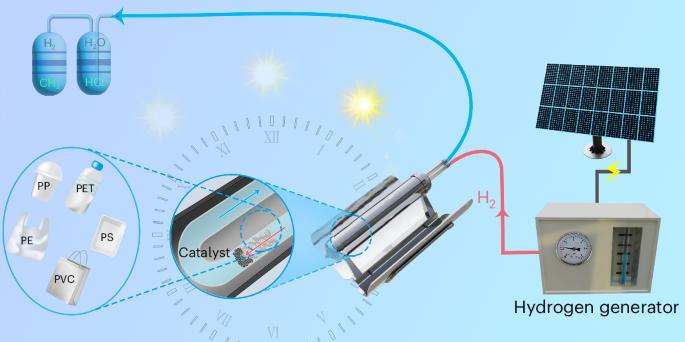Complete hydrogenolysis of mixed plastic wastes
引用次数: 0
Abstract
The accumulation of plastic waste in the environment has led to a global crisis with severe consequences for wildlife and ecosystems. Upcycling offers a promising solution for reducing plastic waste by converting it into valuable chemicals and fuels. Real-life plastic waste exists as complex mixtures of different types of plastic, which poses a key challenge for efficient upcycling. Here, by using sunlight as the sole energy source, we report a thermocatalytic approach for transforming a plastic waste mixture collected from daily usage into methane and HCl using an earth-abundant Ni-based catalyst. This process successfully converted 1.03 g of a plastic waste mixture, containing five types of polyolefin, polyester and polyvinyl chloride, into 1.08 g of methane (yieldC 98%) and 0.045 g of HCl (yieldCl 91%). Catalyst deactivation caused by chlorine poisoning is prevented through the temperature-ramped process driven by the diurnal sunlight cycle, ensuring sustained catalytic activity over a period of 10 days. Real-life plastic waste exists as complex mixtures, posing a challenge for efficient upcycling. Now a sunlight-powered thermocatalytic process using a Ni-based catalyst converts a plastic mixture into CH4, H2O and HCl. Notably, chlorine poisoning is minimized through temperature modulation driven by the diurnal sunlight cycle.

混合塑料废物的完全氢解
塑料废物在环境中的积累已导致全球性危机,对野生动物和生态系统造成严重后果。通过将塑料废物转化为有价值的化学品和燃料,升级再造为减少塑料废物提供了一个前景广阔的解决方案。现实生活中的塑料垃圾是不同类型塑料的复杂混合物,这给高效的升级再循环带来了关键挑战。在此,我们报告了一种以太阳光为唯一能源的热催化方法,该方法利用一种富含土镍的催化剂,将从日常使用中收集的塑料垃圾混合物转化为甲烷和盐酸。该工艺成功地将 1.03 克含有五种聚烯烃、聚酯和聚氯乙烯的塑料废料混合物转化为 1.08 克甲烷(产C 98%)和 0.045 克 HCl(产Cl 91%)。通过昼夜日照周期驱动的温度调节过程,防止了氯中毒导致的催化剂失活,确保了持续 10 天的催化活性。现实生活中的塑料废弃物是复杂的混合物,给高效的升级再循环带来了挑战。现在,一种使用镍基催化剂的阳光热催化工艺可将塑料混合物转化为 CH4、H2O 和 HCl。值得注意的是,通过日光周期驱动的温度调节,氯中毒现象被降至最低。
本文章由计算机程序翻译,如有差异,请以英文原文为准。
求助全文
约1分钟内获得全文
求助全文

 求助内容:
求助内容: 应助结果提醒方式:
应助结果提醒方式:


